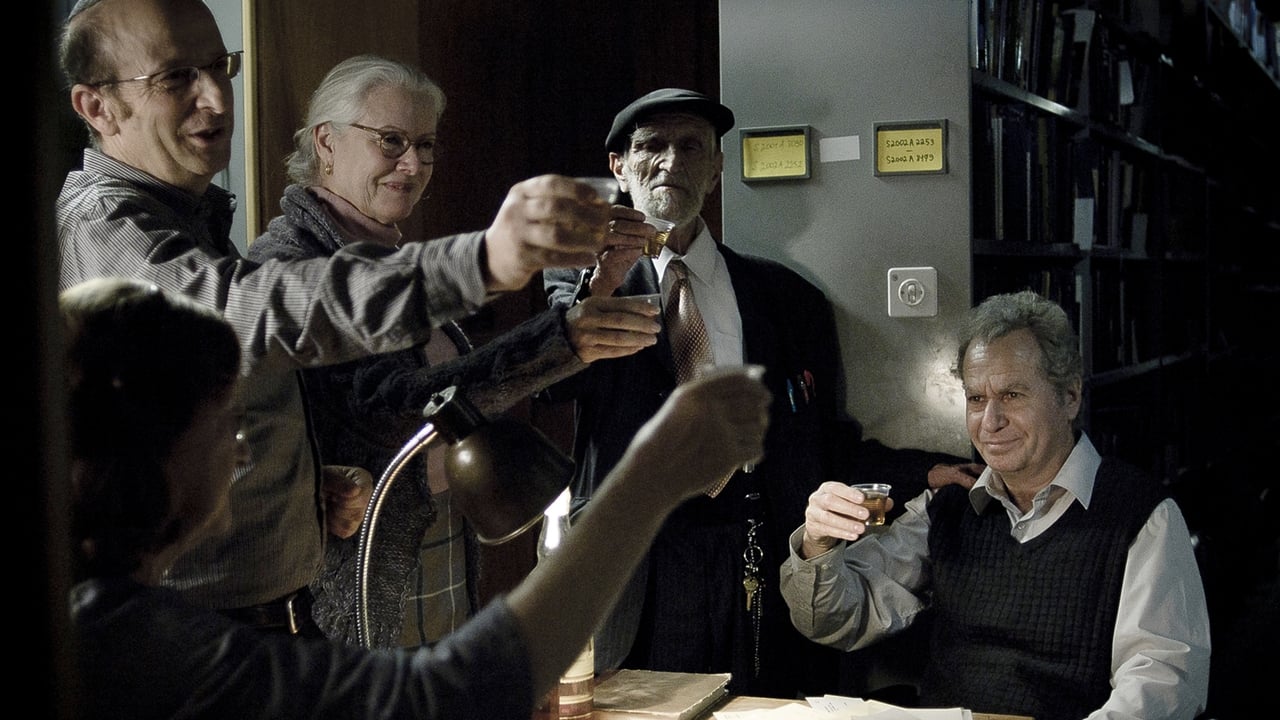alexdeleonfilm
"FOOTNOTES" 2012 (Hearat Shulayim) was the opening film of the Budapest Israeli film week on Dec. 1, 2016 A tale of father and son as Talmudic rivals. Director, Joseph Cedar. 103 minutes. Stars, Lior Ashkenazi and Shlomo Bar-Aba. This unusual subject matter about academic bickering over obscure Talmudic research was an indication that things to come might be contrary to expectation. The film, extremely talky and overloaded with extreme facial closeups was all about a batty old scholar, Eliezer Shkolnik, who has spent his life making notes on the Talmud , and is basically "out of it" (to the point that he doesn't even understand what security guards are for at checkpoints) and is a candidate for a major national prize. Hieever this highly prestigious award is mistakenly given to his handsome charismatic but more superficial professor son Uriel-- who has certain guilt feelings about the misaccreditation and struggles to set things right against the stonewalling opposition of the awards committee. The bulk of the picture is taken up with internal academic bickering over whether or not Papa should ultimately be recognized or not. Basically what we get is dramatically charged father and son rivalry tale cum inquiry into academic chicanery. The primarily Hungarian-Jewish audience was enthralled, but to me it was a shrill shaggy dog story, basically the making of a mountain out of a molehill. Aren't there more important things to worry about in Israel than who should get the credit for marginal notations on the Talmud?. The father was played by Shlomo Bar-Abba (66) and the son by Lior Askenazi (43) both well known Israeli actors.Roger Ebert in one of his last reviews, focusing on the father son relationship, gave this film a rave review mentioning that it was to be seen as a comedy. I personally saw nothing comic in it at all and, while somewhat impressed by certain scenes, was not quite as swept away as Roger. To me it was too much of a talkathon with too many extreme facial closeups. Nevertheless, interesting for the portrayal of internal academic politics and backbiting which is not a topic often addressed in the current cinema. PLOT: Talmud scholar Eliezer Shkolnik (Shlomo Bar-Aba) has worked in obscurity for years at Jerusalem's Hebrew University. In contrast, Eliezer's son, Uriel (Lior Ashkenazi), also an academic, has published many books, received numerous accolades and is something of a social celebrity. Eliezer looks down on his son's achievements and pursuit of fame, and so the pair have a rocky relationship. Their rivalry comes to a head when Eliezer receives word that, at long last, he is to be the recipient of the prestigious Israeli Prize. Yes, in the end Dad will get the prize but not everybody is happy about it.image3.jpeg
Lee Eisenberg
One thing that has become common in American popular culture - if you can call it culture - is to have all sorts of salacious family feuds. That makes it all the more satisfying to see Joseph Cedar's "Hearat Shulayim" ("Footnote" in English). The movie focuses on a father and son, both of whom are professors at the Talmudic Research department of the Hebrew University of Jerusalem. Despite the father's extensive studies, the Israel Prize committee refuses to recognize his work, while the son has garnered a lot of respect. One day, the father receives a call announcing that he's winning the prize. There's just one problem: the committee meant to call the son.The movie makes sure to avoid tabloid-style situations. It takes a serious approach to the situation. Probably the most effective scene is when the son meets the Israel Prize committee in a cramped office and reminds them of the hypocrisy of their decision to deny his father the prize. Nonetheless, the tension between father and son remains. In the end, it's a really good movie. I haven't seen many Israeli movies, but now I would like to.
gradyharp
FOOTNOTE is an appropriately titled sparklingly intelligent and entertaining film written and directed by Joseph Cedar. With a small cast and a focused story this little film form Israel is not only a pleasure to watch as a story performed as shared by brilliant actors, but it is also one of the most visually artistic and creative venture of cinematography to be on the small screen in a long time: the genius cinematographer is Yaron Scharf. Add to this a musical score that enhances every moment of the story - courtesy of composer Amit Poznansky - and the film simply succeeds on every level.In a most ingenious way we are introduced to the two main characters - father and son, both professors in the Talmud department of the Hebrew University in Jerusalem. The film opens on the confused and somewhat unattached facial expression of the seated father Eliezer Shkolnik (Shlomo Bar Aba) as he listens to his ebullient son Uriel Shkolnik (Lior Ashkenazi) being inducted into the prestigious Israeli academic union. Uriel's acceptance speech reflects his childhood when his father informed him upon questioning that he was a 'teacher' - an occupation the young Uriel found embarrassing at the time, but now honors his father for this guidance. After the ceremony we slowly discover that there is a long-standing rivalry between father and son. Uriel has an addictive dependency on the embrace and accolades that the establishment provides, while Eliezer is a stubborn purist with a fear and profound revulsion for what the establishment stands for, yet beneath his contempt lies a desperate thirst for some kind of recognition: his only clam to fame after long years of intensive research is that the man who published his findings mentions Eliezer in a footnote. When it comes times for the Israel Prize, Israel's most prestigious national award, to be awarded, a clerical error results in a telephone call informing Eliezer that he has won, while in reality the award was meant for his son Uriel. How this error is resolved open all manner of windows for examining family relationships, fame, pure academia, and forgiveness.The film is an unqualified success. Lior Ashkenazi (so well remembered from 'Walk on Water' and 'Late Marriage' among others) gives a bravura performance and that of Shlomo Ben Aba balances it in quality. The supporting cast is strong. Joseph Cedar has produced a fine film very much enhanced by the brilliance of the cinematography that tells the story as much as the dialogue. Grady Harp
peter henderson
The use of on screen checklists as the start of "Footnte" to establish the identities of the lead characters is a clever and engaging way to get the viewer in the mood for a humorous cinematic experience. The comic devices - the chair shuffling in the fatal meeting of the Israel Prize committee - evinces that sort of cruel but loving satire that made "Spinal Tap" such a rich experience. (If you don't like the comparison, check out the final scene in which Nigel, air guitaring the solo in "Sex Farm" - the song that has taken off on the Japanese charts - is called back on stage and back into the arms of the rejuvenated band)But then the mood of "Footnote" changes, with the spirited and dignified defense by the son of his father's worthiness for recognition. Nobility of spirit is a phrase that comes to mind. The viewer realizes that Cedar is a director and writer of substance. This satisfying realization is enhanced when the father's chief detractor relents in his opposition to the loyal son. And then Cedar once again changes the mood of the film, with the father's critical dismissal of the worth of his son's scholastic achievements. By this time the viewer is in no doubt as to the masterful direction and writing and is speculating on how the characters will work out the dramatic culmination of the film.I was reminded of "Ve'Lakhta Lehe Isha" ("To Take a Wife"), the 2004 film created by Ronit and Shlomi Elkaberz. "Footnore" is a lot more fun, a lot less harrowing but I recalled my "Eureka" moment while watching that film, when I realized it was a retelling of the biblical book of the prophet, Hosea. Had Cedar created a similar cinematic parable? Had Cedar tapped into some rich vein of cultural material to make a point, argue a thesis, establish some view of Israeli society?The expression, "Chekovian" came to mind. I was reminded of Sidney Lumet's 1968 cinematic recreation of "The Seagull". It remains for me the only re-working of the turn of the twentieth century Chekov's dramatic output that has ever really translated the validity of the characters and situations into the mindset of a mid to late twentieth century audience. Cedar has achieved a similar feat, in making the life experiences of modern Israelis intelligible to outsiders.The open ended culmination, the cryptic subtitle, "Professor Shkolnik's Revenge" leaves it open to the viewer to make the same mistake as the people who mixed up father and son when contacting the winner of the Israel Prize. Is the subtitle referring to the father of the son?The richness of the characterization makes the film a lot more satisfying than many of the films that criticize the values of Israeli society. Take for instance, "Lemon Tree", or even "Waltz With Bashir". Cedar gives us much more rounded and human (dare one say less caricatured) characters. But the viewer is left with the feeling that Cedar is saying something of substance about Israelis society. I was wrestling with this question as the film neared (but never fully enunciated) its dramatic climax.Is he saying that the elder generation or Israeli leadership is misguided in the way they govern? Is he saying that the next generation must value what is good in their parents, but seek to rectify the mistakes they have made? The way the film raises such questions marks it as a cinematic experience of great distinction as well as a thoroughly engrossing and satisfying way to spend time with characters of warmth, complexity and genuine decency


 AD
AD



